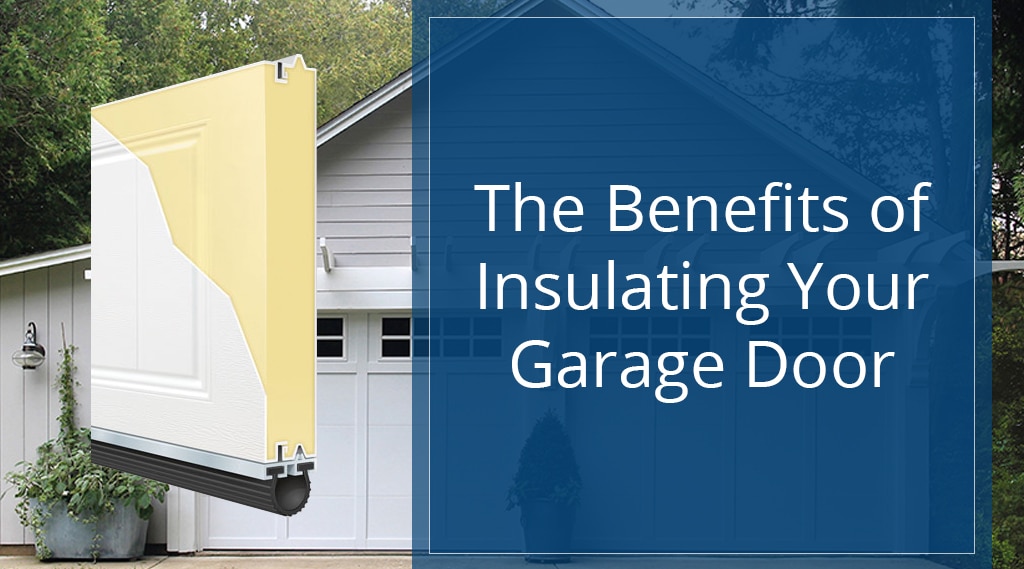
The Benefits of Insulating Your Garage Door

Your garage is one of the biggest rooms in your house. It’s also the biggest entrance into your home. Like front doors and patio doors, garage doors can help improve the energy efficiency of your home. Insulated garage doors can help regulate the temperature and reduce the stress on your heating and cooling systems. This is especially true in areas that experience extreme temperatures.
Luckily for us, that’s not the case in Southern California but there are other reasons to choose insulated doors. In this post, we’ll detail the benefits of insulating your garage door.
What is an Insulated Garage Door?
Garage doors act as a buffer between the outdoor and indoor temperatures. Sure, you probably don’t live in your garage and you might not even spend a lot of time in your garage but hot or cold air in your garage can affect the rest of your home. The rest of your exterior walls have insulation in them to create a thicker buffer against outside temperatures, your garage door should have a thicker buffer, too.
Insulated garage doors have two panels or a hollow door frame filled with insulating material. The added insulation helps to moderate the temperature in your garage.
The Benefits of Insulating Your Garage Door
If you’re considering replacing your garage door consider the benefits of insulated doors.
- Better Energy Efficiency
- Noise Reduction
- Enhanced Door Strength
- Increased Comfort
Better Energy Efficiency
For optimal energy efficiency, the U.S. Department of Energy↗ recommends insulating your home from the roof to the foundation. Since most garages don’t have heat or air conditioning, the temperatures in this space affect any attached spaces. Improving the efficiency here can help improve efficiency and comfort elsewhere.
Improved Energy Performance
Insulated garage doors create a barrier against cold air in the winter. Minimizing the transfer of cold temperatures into the garage will keep adjoining spaces warmer. The barrier also blocks excess heat from entering the garage in the summer keeping adjoining spaces cool and preventing cool air from escaping. Moderate temperatures in the garage reduce the workload on heating and cooling systems, making the system more efficient and more likely to last longer.
Increased Comfort
Better energy efficiency creates more comfortable and more usable spaces. A garage with more moderate temperatures is better for working in and for storing paints, oils, photos, or food.
Noise Reduction
Garage doors can be noisy, especially older and abused units. The additional weight of insulation helps reduce the rattling of doors resulting in quieter operation. But noise reduction doesn’t stop there. If you’re someone who uses the garage as a gym, workshop, or media room on fight night, you can shut the door and isolate noise in the garage. Additionally, if you live on a busy street, insulated doors can block external sounds so they won’t bother you as much when you’re working in your garage or home.
Enhanced Door Strength
Insulated doors are designed with additional layers which also make them stronger and more durable than single-layer doors. These doors are less likely to dent, rust, or warp. The best-insulated doors are made with insulated steel frames which are lightweight and strong.
Additional Ways to Improve the Efficiency of Your Garage
It’s also worth noting that garage door replacement is the easiest way to update the look of your house AND it’s one of the most valuable updates you can make. According to remodeling’s 2020 Cost vs Value Report↗ homeowners who sell their homes recuperate 94% of the cost of the new door↗. So if you choose to replace your garage door with a more efficient option, it’s likely that you’ll recoup the cost over time in added value and energy savings.
Below is a short list of additional steps you can take to improve the efficiency of your garage.
- Properly seal the garage door
- Insulated walls
- Efficient windows
Properly Seal the Garage to Reduce Air Leaks
In addition to thermal transfer through the door, air leaks around the door affect the door’s energy performance. Gaps around the garage door or between panels allow air to pass from the exterior to the interior and vice versa. Installing properly fitted seals, weatherstrips, and hardware can reduce energy loss.
Insulate Walls
Insulating your door is just one step toward optimum efficiency. Go a step further by adding insulation to the walls around the garage and ceiling.
Efficient Windows
Windows can be a beautiful feature on garage doors but they aren’t an efficient option. If you want windows on your door panels, choose more efficient options. Look for windows with insulated glass, low-emissivity coatings, or films.
Call Heritage Garage Door for New or Replacement Doors
Contact us today to discuss garage door options. We’ll help you decide if an insulated garage door is the best option for your home. We offer a variety of doors with insulated panels and insulated window options.
Heritage Garage Door operates in Southern California.


